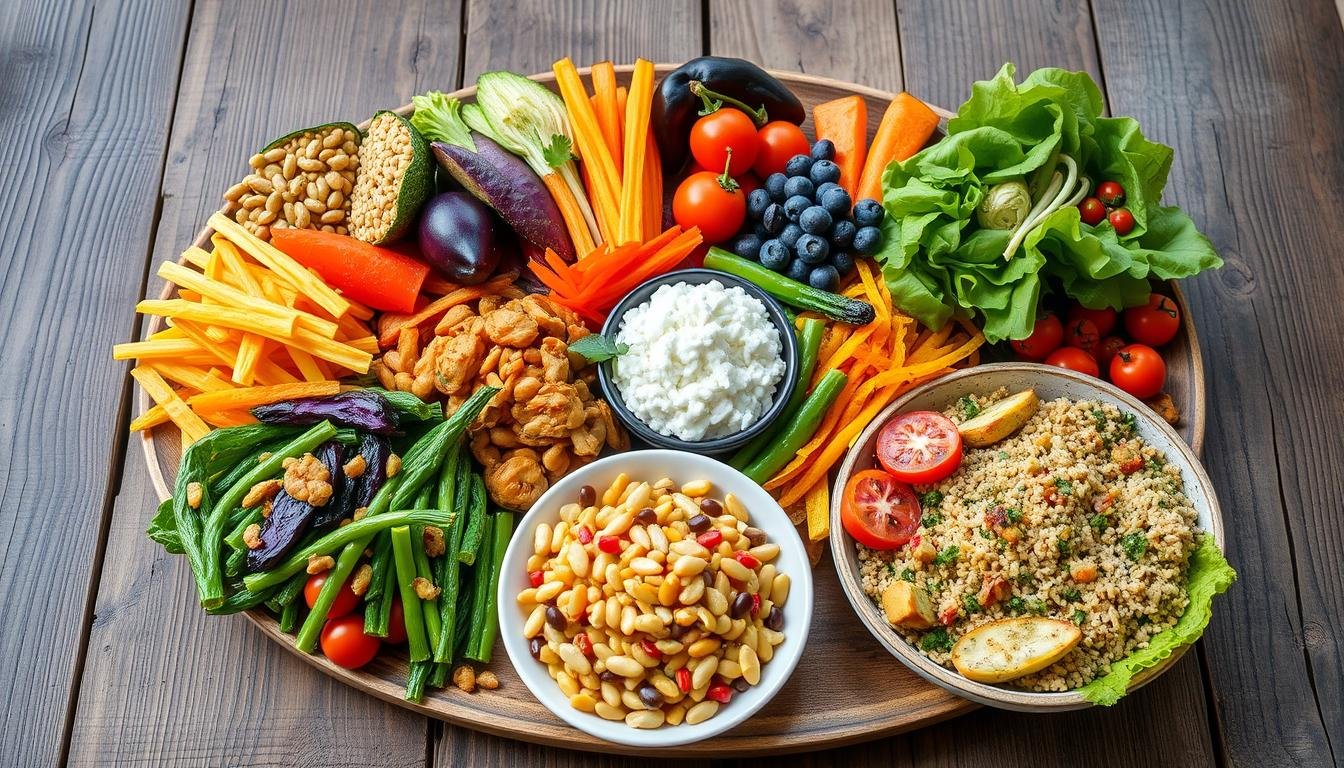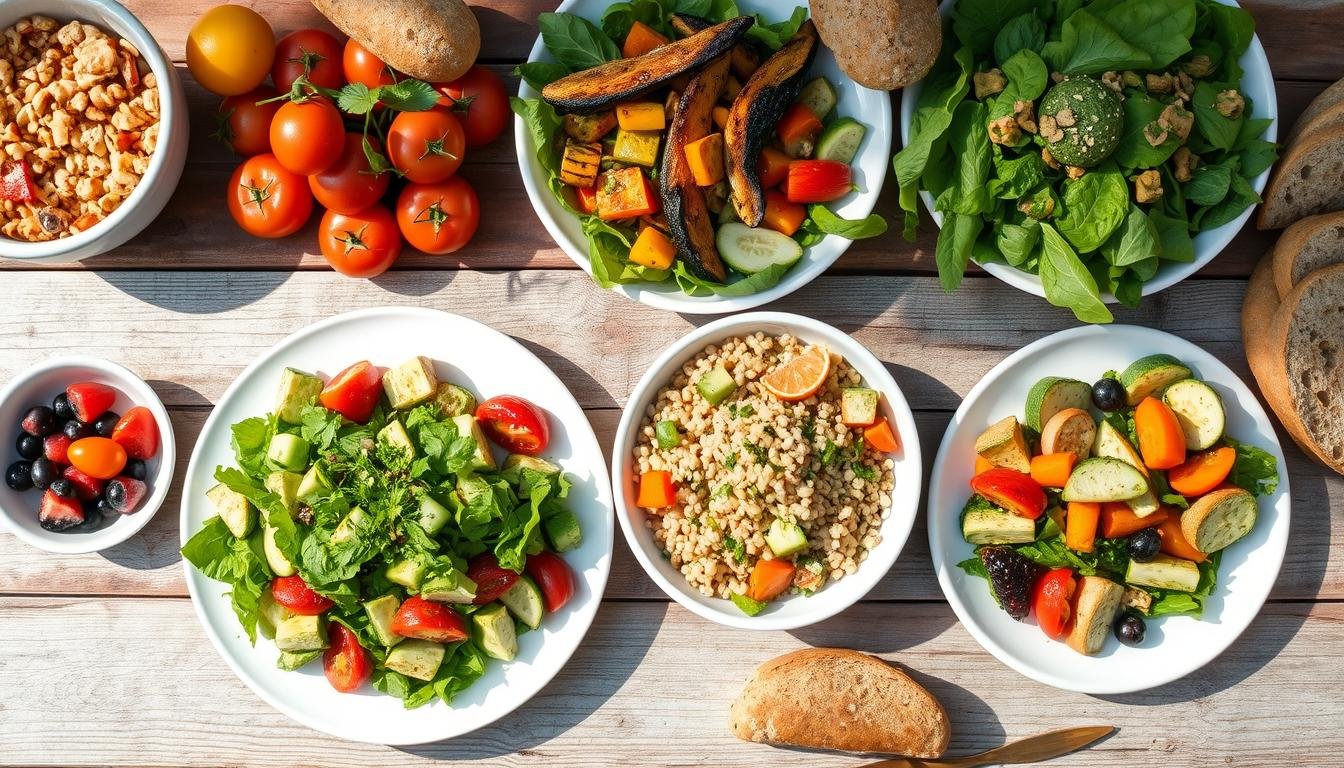Going vegetarian can open up a world of health benefits. A well-planned vegetarian diet is full of nutrients. It can lower the risk of heart disease, diabetes, and some cancers. But, not all vegetarian diets are the same.
Vegetarian Food Some may eat a lot of processed foods. These foods are often high in calories, sugar, fat, and salt. They can also be low in fruits, vegetables, whole grains, and other important foods. With the right planning, a vegetarian diet can give you all the nutrients you need.
This is true for people of all ages, including pregnant and breastfeeding women, and athletes. They can get everything they need from a vegetarian diet.
Key Takeaways
- A well-planned vegetarian diet can offer numerous health benefits, including reduced risk of heart disease, diabetes, and certain types of cancer.
- Not all vegetarian diets are equally nutritious, as some may rely too heavily on processed foods high in calories, sugar, fat, and salt.
- With proper planning, a vegetarian diet can provide all the necessary nutrients for people of all ages, including pregnant and breastfeeding women, and competitive athletes.
- The key to a healthy vegetarian diet is to focus on a variety of whole, plant-based foods, such as fruits, vegetables, whole grains, legumes, nuts, and seeds.
- Consulting with a healthcare professional or a registered dietitian can help ensure a vegetarian diet is well-balanced and meets individual nutritional needs.
Also Read : Easy Healthy Breakfast Recipes
Understanding Vegetarian Diets
The term “vegetarian” covers many dietary choices, each with its own rules. Knowing about vegetarian diets helps people make choices that fit their beliefs and health needs.
Also Read : Delicious Vegetarian Food Recipes To Every Day
Types of Vegetarian Diets
Vegetarian diets fall into several groups:
- Lacto-vegetarian: Does not include meat, fish, poultry, or eggs but allows dairy.
- Ovo-vegetarian: Does not include meat, poultry, seafood, or dairy but allows eggs.
- Lacto-ovo Vegetarian: Does not include meat, fish, or poultry but allows dairy and eggs.
- Pescatarian: Does not include meat or poultry but allows fish and seafood.
- Vegan: Excludes all animal products, including meat, poultry, fish, eggs, and dairy.
Some people follow a “flexitarian” diet. It’s mostly plant-based but sometimes includes small amounts of meat, dairy, or eggs.
“A vegetarian diet can be one of the healthiest ways to eat, but it requires planning to make sure you get all the nutrients you need.”
Also Read : The Impact Of Fast Food On Health
Planning a Nutritious Vegetarian Food Diet

Creating a healthy vegetarian diet means planning well to meet your nutritional needs. It’s important to pick a variety of plant-based foods like fruits, vegetables, whole grains, nuts, and legumes. These foods are full of nutrients and help you stay healthy.
Also Read : How Can You Manage Stress During Exam?
Recommended Daily Servings
The 2020-2025 Dietary Guidelines for Americans offer advice for a 2,000-calorie vegetarian diet. They recommend the following daily servings:
- 2 1/2 cups of fruits and vegetables
- 6 1/2 ounces of whole grains
- 3 cups of dairy or dairy alternatives
- 3 1/2 ounces of plant-based proteins
Working with a registered dietitian can help you make a personalized vegetarian meal plan. They ensure you get all the nutrients you need and enjoy a balanced diet.
Also Read : Which Are Some Classic Food Dinner Recipes?
| Food Group | Recommended Daily Servings |
|---|---|
| Vegetables | 2 1/2 cups |
| Fruits | 2 cups |
| Grains (mostly whole) | 6 1/2 ounces |
| Dairy or alternatives | 3 cups |
| Protein (plant-based) | 3 1/2 ounces |
Following these recommended servings helps you get a balanced intake of essential nutrients. This supports a healthy, nutritious vegetarian diet.
Key Nutrients in a Vegetarian Food Diet

Following a well-planned vegetarian diet meets all nutritional needs. Yet, some nutrients need extra focus: calcium and vitamin D, vitamin B-12, and protein.
Calcium and Vitamin D
Calcium keeps bones and teeth strong. Vegetarians can get calcium from dairy alternatives, plant-based milks, and leafy green vegetables. They can also find it in fortified foods. Vitamin D helps your body use calcium. You can get it from the sun, fortified foods, and supplements.
Vitamin B-12
Vitamin B-12 is key for making red blood cells and preventing anemia. It’s mostly in animal products. Vegetarians and vegans might need fortified foods or supplements for this vitamin.
Protein
Protein is vital and comes from plant-based sources like legumes, nuts, seeds, and soy products. Eating a mix of whole grains, legumes, and other protein-rich foods helps vegetarians get enough protein. This makes for a balanced diet.
| Nutrient | Importance | Vegetarian Sources |
|---|---|---|
| Calcium | Supports strong bones and teeth | Dairy alternatives, leafy greens, fortified foods |
| Vitamin D | Aids calcium absorption | Sun exposure, fortified foods, supplements |
| Vitamin B-12 | Crucial for red blood cell production and preventing anemia | Fortified foods, supplements |
| Protein | Essential macronutrient for growth and maintenance | Legumes, nuts, seeds, soy products |
“A well-planned vegetarian diet can provide all the necessary nutrients, but there are a few key components that require special attention.”
Vegetarian Food and Omega-3 Fatty Acids

Omega-3 fatty acids, like DHA and EPA, are key for heart health and fetal growth. Vegetarians might not get enough of these nutrients since they don’t eat fish. Luckily, they can get them from flaxseeds, walnuts, soy, and fortified foods.
Studies show vegetarians without these omega-3 sources might need supplements. This is especially true for heart health and fetal development. DHA and EPA are vital for these important tasks.
| Vegetarian Omega-3 Sources | Benefits |
|---|---|
| Flaxseeds | Rich in ALA, a type of omega-3 fatty acid |
| Walnuts | Contain ALA and other beneficial nutrients |
| Soy | Provides ALA and can be found in various forms |
| Fortified Foods | Enriched with DHA and EPA for added nutritional value |
By adding these plant-based, vegetarian-friendly sources of omega-3 fatty acids to their diet, vegetarians can meet their nutritional needs. This supports their health and well-being.
Essential Minerals for Vegetarians

Keeping a vegetarian diet balanced means paying extra attention to getting enough iron, zinc, and iodine. These minerals are harder to get and absorb from plant-based sources than from animal products. So, vegetarians must make a conscious effort to eat foods rich in these nutrients.
Iron and Zinc
Great plant-based sources of iron are dried beans and peas, lentils, whole grains, dark leafy greens, and dried fruit. Eating these foods often is key to getting enough iron. Zinc is found in whole grains, soy products, lentils, nuts, and wheat germ.
Iodine
Iodine is vital for thyroid health. Vegetarians can get it from iodized salt, seaweed, and some fortified foods. It’s important to eat enough iodized salt, seaweed, and fortified foods to stay healthy.
Eating a mix of nutrient-rich plant-based sources helps vegetarians meet their mineral needs. This way, they can enjoy the health perks of a balanced diet.
Vegetarian Food: Transitioning Tips

Switching to a plant-based eating lifestyle is exciting but might feel daunting at first. The good news is, you can ease into a vegetarian diet step by step. There are many strategies to make this transition easier and more fun.
Start by slowly cutting down on meat and adding more meatless meals to your diet. Try dishes like spaghetti with tomato sauce or a tasty vegetable stir-fry a few times a week. As you get more comfortable, look for ways to substitute meat in your favorite recipes, like using tofu instead of chicken in fajitas.
Discovering new vegetarian cuisines is a great way to find delicious and healthy meatless meals. Look through vegetarian cookbooks and try new healthy vegetarian recipes. This can give you endless ideas and help you smoothly transition to a vegetarian food diet.
The key to a successful transition is to go at your own pace and enjoy the journey. Experiment with new ingredients, try different vegetarian meal planning strategies, and increase your fruits and vegetables intake. With creativity and an open mind, you’ll soon love the benefits of a vegetarian food diet.
Health Benefits of a Vegetarian Food Diet

A growing number of studies show that a well-planned vegetarian diet has health perks over diets with meat. These diets are often lower in bad fats, cholesterol, and animal proteins. They are higher in good carbs, fiber, vitamins, minerals, and plant chemicals. This mix can lower the risk of chronic diseases like heart disease, type 2 diabetes, and some cancers.
Vegetarian diets also help with weight management and increased longevity. Choosing this diet is not just for health reasons. Many do it for environmental, ethical, and economic reasons too. By eating less animal products, vegetarians help make food production more sustainable. They also match their eating habits with their values.
| Health Benefit | Description |
|---|---|
| Heart Health | Vegetarian diets are linked to a lower risk of heart disease and stroke. This is because they have less saturated fat and cholesterol. |
| Diabetes Prevention | Research shows that a vegetarian diet can prevent type 2 diabetes or help control it in those who already have it. |
| Cancer Prevention | Eating more fruits, vegetables, and whole grains in a vegetarian diet may lower the risk of cancers like colorectal, breast, and prostate cancer. |
The health benefits of a vegetarian diet are clear and can greatly improve one’s health. They also help the environment and ethical food issues flavoured dumpling toast weeknight broth taco salsa caramelized masala noodle.
Also Read : How Can I Prepare Delicious Banana Cake Recipes?
Conclusion
Choosing a well-planned vegetarian diet brings big health perks and meets the nutritional needs at every life stage. By eating a mix of plant-based foods, you can lower your risk of chronic diseases. This supports your health and helps the planet and animals too.
Switching to a vegetarian lifestyle takes some thought and attention to important nutrients. Yet, the benefits for your health and values make it a great choice. A balanced vegetarian diet is tasty and healthy. It boosts your physical and mental well-being and helps the environment and ethical food issues.
Deciding to go for a plant-based diet is up to you. But, the strong evidence of its health benefits makes it a strong option. It’s a good way to better your eating habits and quality of life.
FAQs
Q: What are the best vegetarian options for protein?
A: Some of the best vegetarian options for protein include tofu, chickpeas, lentils, tempeh, and quinoa. Incorporating these ingredients into your meals can help ensure you receive adequate protein on a vegetarian diet.
Q: Can you recommend easy vegetarian dinner recipes?
A: Absolutely! Easy vegetarian dinner recipes include dishes like one-pan roasted vegetables with tofu, pasta with marinara sauce, chickpea curry, and stuffed peppers. These recipes are not only simple but also packed with flavor.
Q: What are some popular vegetarian meals for a comfort food night?
A: Popular vegetarian comfort food meals include mac and cheese, veggie tacos, and a hearty bolognese made with lentils. You can also try vegetarian chili or a creamy vodka sauce over pasta for a satisfying dinner.
Q: How can I incorporate more vegetables like cauliflower and broccoli into my diet?
A: You can incorporate more vegetables like cauliflower and broccoli by roasting them as a side dish, adding them to stir-fries, or using them in soups and stews. Cauliflower can also be used to make a delicious cauliflower rice or mashed cauliflower as a low-carb alternative.
Q: What is a good vegetarian recipe for a quick lunch?
A: A quick vegetarian recipe for lunch could be a tofu lettuce wrap filled with crispy vegetables and a flavorful sauce. You can also prepare a refreshing chickpea salad with tomatoes, cucumbers, and a drizzle of tahini for a nutritious meal.
Q: Are there vegetarian versions of traditional street food?
A: Yes, many traditional street foods can be made vegetarian. For example, falafel wraps, veggie tacos, and portobello mushroom burgers are popular vegetarian street food options that are full of flavor and satisfying.
Q: What are some vegetarian options for grilling during summer?
A: Great vegetarian options for grilling include skewered vegetables like bell peppers, zucchini, and eggplant, as well as veggie burgers and grilled corn on the cob. You can also grill marinated tofu or portobello mushrooms for a hearty main dish.
Q: How can I make a vegetarian meal that is also kid-friendly?
A: To make a kid-friendly vegetarian meal, consider dishes like cheesy spinach and ricotta stuffed pasta shells, veggie fritters served with tzatziki, or tacos filled with seasoned black beans, corn, and cheese. Kids often enjoy colorful and fun presentations!
Q: What is a good vegetarian recipe that uses chickpeas?
A: A delicious vegetarian recipe using chickpeas is chickpea curry. This dish can be easily prepared with chickpeas, tomatoes, coconut milk, and spices like cumin and coriander. Serve it over rice or with naan for a wholesome meal.
Q: What are some creative ways to use butternut squash in vegetarian cooking?
A: Creative ways to use butternut squash include making a creamy butternut squash soup, roasting it with herbs for a side dish, or incorporating it into pasta dishes. You can also use it in curries or as a filling for stuffed peppers.





